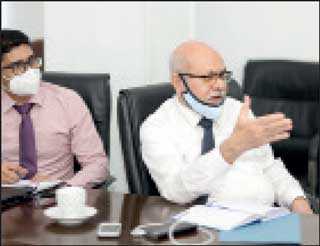Thursday Feb 19, 2026
Thursday Feb 19, 2026
Friday, 11 December 2020 00:00 - - {{hitsCtrl.values.hits}}

From left: Mohamed Fareed, Dr. W.G. Somaratne, Udaya De Silva, T.M.F. Packeer, Chandra Wickramasinghe, Paddy Paul, Himali Athaudage, Janaka Jayalath, Thilak Weerasinghe,Nipuni Daluwatte, Tharanga Atigala
 |
| Tourism Skills Council Chairman T.M.F. Packeer |
Tourism Industry Skill Council, which is under the aegis of the Ministry of Skills Development and Vocational Training (TVEC, NAITA and VTA) has recommended a scheme to address the issue of
creating employment for those impacted by COVID-19, and also by supporting the vacuum of trainers in the existing vocational system.
An inaugural meeting was held on 2 December, at TVEC office complex, chaired by Additional Secretary Sector Skill Development Himali Athaudage and in the presence of TVEC Director General Janaka Jayalath, Chairman T.M.F. Packeer, Board Member/Secretary Paddy Paul and from Tourism Industry Skill Council, Administrative Manager Mohamed Fareed, Program Manager Udaya De Silva and Reform Specialist Dr. W.G. Somaratne, from SSDP, Director Training Shanthi Edirisighe, Deputy Director Training Tharanga Atigala, Nipuni Daluwate from VTA, Tourism Advisory Council Member Chandra Wickramasinge and SLAITO President Thilak Weerasinghe.
The President, during his address to the economic summit, articulated that the present pandemic situation is an unprecedented period and hence, to adopt new methods and achieve change and be more flexible.
Tourism is a complex set of industries including accommodation, food and beverage services, transportation, guiding, wellness, and travel service, it encompasses domestic, inbound and outbound travel for business, leisure or other purposes.
Sri Lanka Tourism, which was declared the top tourist destination in the world in 2018, saw a massive slump in tourist arrival in the wake of the terrorist attack in April ‘19. However, due to untiring effort by the Government, security forces and Sri Lanka Tourism authorities and the private sector taking collective remedial steps to promote the destination, the tourism industry was able to recover rapidly, which resulted in attracting 1.9 million tourists at the end of 2019.
In 2018, total earnings from tourism stood at $ 4.4 billion, contributing 12% to the GDP. Direct employment stood at approximately 404,000, In accordance with ILO, Sri Lankans employed in the tourism industry stood at 6.8% of its population.
The present COVID-19 outbreaks, reminded us how vulnerable this industry is to external forces, which have resulted thousands of tourist service establishments that range from conglomerate to souvenir sellers, which estimate to approximately million dependents are facing unpresented period of zero revenue leaving the stakeholders in the industry at a dilemma on the next step to be taken.
Having understood the gravity of this pandemic crisis, many countries have already infused billions of much needed money to their economies to protect the industry and fiscal market.
Tourism is a hard-hit sector, since the higher the share of employment, the higher the impact to the workforce and economies. hence, creation of skilled job opportunities and growth is the key priority of our council and the industry leaders. Therefore, we propose upskilling and reskilling the workforce impacted in this industry, to healthcare/elder care sector, agriculture sector, and teaching foreign language. This transformation will benefit/uplift the livelihood of some sectors in the industry, thereby contributing to the Government’s mission of rapid economic recovery of the nation.
Tourism Council, with the guidance and support of the Ministry of Skill Development and Vocational Training and Ministry of Tourism is planning a pilot project to implement to reskill/upskill the guide lectures and chauffeur guides lectures as teachers, and absorb those qualified as trainers within the TVEC, NAITA and VTA network island-wide.
It is reported that the Government of Japan has entered into an understanding with Foreign Employment Bureau and VTA, to recruit healthcare and eldercare workers from Sri Lanka, to meet the labour shortage in the healthcare sector.
Agriculture is also identified as an alternate profession to be introduced as one of the rapid economic recovery projects, for the tourism workforce, which will have two-fold economic benefit, for the employer and employee if successfully implemented also taking into consideration and introducing the concept of allocating a land area, in the hotel premises for home gardening and encourage all employees to be multiskilled and partners/beneficiaries to this project.
The Government to consider allocating unutilised fertile land for agriculture and facilitating loan schemes or any suitable financial model to encourage to grow produce suitable for export.
The Government to adopt a mechanism to purchase the harvest from these individuals/institutions.
Tourism Industry Skill Council, has successfully negotiated with the British Council and will implement an online English program for the benefit of its workforce in particular and is also open to the general public. A similar language skill methodology to include other foreign languages that is in demand for the industry will be implemented shortly.
As stated above, it has become an absolute necessity to introduce and implement a revenue model for the workforce in the tourism industry which is severely impacted by COVID-19, to Zero Revenue for the past nine months to date. It is reported that the industry will only recover by 2022. The present inactive period is a crucial time to implement meaningful, remedial measures almost immediately to avoid any negative social impact.
In accordance to the market survey, it is predicted that Sri Lanka will be a sought-after destination by 2022, Sri Lanka being a tropical island with sandy beaches, heritage sites incredible cuisine, wildlife, and a tourist-friendly nation, are many reasons to include in the holiday makers travel bucket list, hence Sri Lanka tourism should be ready, with new norms to serve its visitors as per their expectations. Therefore, the necessity to retain a skilled workforce, which is the human capital/asset of a nation.